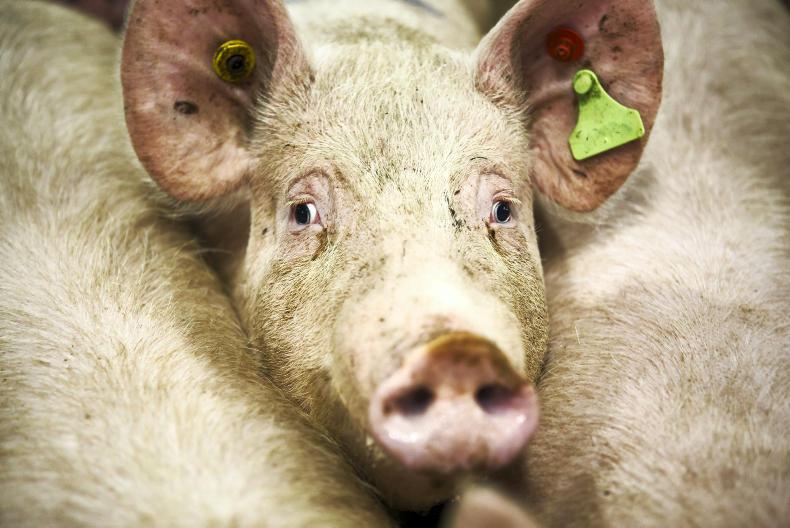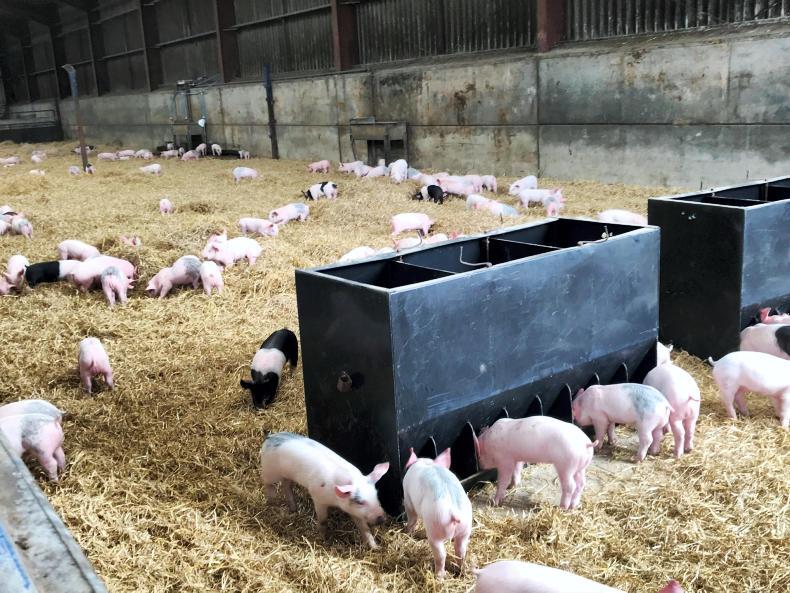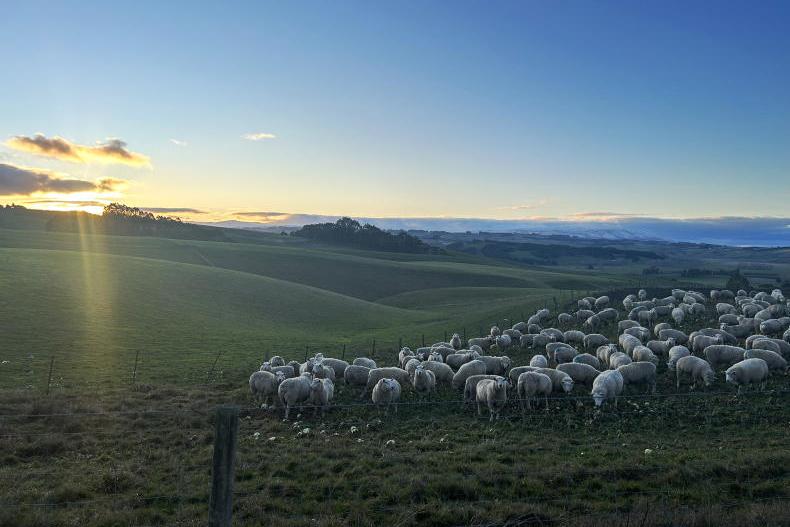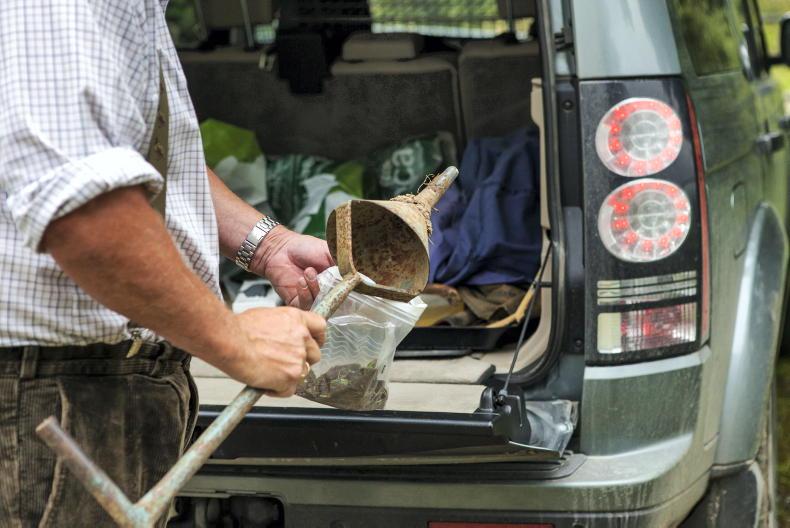The African swine fever virus in pigs can be spread through direct contact with live and dead infected pigs, both domestic and wild boar. The virus is environmentally resistant and can remain infective over the cold winters of Eastern Europe in the carcases of infected wild boar. For this reason, infection of wild boar populations in Europe has played a major role in the spread of the disease in affected countries. Ireland does not have a wild boar population and it is prohibited to bring wild boar into Ireland.
The virus can also be spread by the use of infected germinal products or via contaminated clothing, vehicles and equipment.

Everyone needs to play a part to keep African Swine Fever (ASF) out of Ireland.
Although ASF does not affect humans and the meat is safe to eat, the virus can survive for months in chilled, preserved and frozen pig meat products. Outbreaks of ASF in domestic pigs have been attributed to the feeding of infected food waste (swill) to pigs, particularly in Asia, where the feeding of swill to pigs has only recently been prohibited. The feeding of food waste containing meat to all livestock has been banned in the EU since 2002.
EU legislation regulates the movement of live pigs and pig products, including meat products, from affected countries to prevent the spread of ASF. Compliance with the requirements of EU legislation will mean that Ireland will remain protected from this deadly disease.
What farmers and small holders need to do to protect their pigs?
Farmers should undertake a thorough review of biosecurity on their farm. Under the current Rural Development Programme (2013-2020), funding is available to all commercial pig farmers, through the Targeted Advisory Service for Animal Health (TASAH) mechanism, to have a comprehensive and objective Biocheck UGent biosecurity review carried out on their farms by a trained private veterinary practitioner. This service is free of charge to pig farmers.
Animal Health Ireland (AHI) delivers the TASAH-funded biosecurity reviews on behalf of the Department of Agriculture, Food and the Marine. To avail of the Biocheck review, contact your private veterinary practitioner or Animal Health Ireland.
Pork and pork products should not be brought on to pig farms where there is a risk that they could inadvertently be eaten by pigs
Visitors and staff should observe a pig-free period of 72 hours before entering an Irish pig farm if they have been in contact with pigs or wild boar in ASF-affected countries and should never wear the same footwear or clothing as they may be contaminated. Only allow essential visitors on to your farm and ensure proper hygiene and disinfection procedures are adhered to before coming into contact with pigs. Cleaning and disinfection facilities should be available for pig transport vehicles and equipment.
Pork and pork products should not be brought on to pig farms where there is a risk that they could inadvertently be eaten by pigs. Open farms should take measures to ensure that visitors do not feed the pigs, picnic areas and cafes are not located near pigs, and that there are secure bins available for food waste. Outdoor pigs must be securely fenced to prevent access to rubbish.
All pig owners, even if they only have one or two pigs, must be registered with the Department of Agriculture, Food and the Marine. Only pig owners with a valid pig herd number are allowed to own or trade in pigs.
What the Department is doing?
The Department is involved in a range of activities aimed at minimising the risk of ASF entering Ireland, including monitoring the international disease situation, working with international partners and monitoring the movement of pigs via the EU TRACES online platform.
The Department has been engaging in an intensive communications programme to highlight the risk of ASF entering Ireland to all stakeholders. Disease fact sheets are available for both vets and farmers, and a letter was circulated to all registered pig keepers as part of the annual pig census. Posters have been placed in airports and on ferries warning people travelling abroad about the risk of bringing home meat products. Tailored biosecurity information including a multilingual poster has been produced for farmers and farm personnel. The Department circulated specific advice regarding ASF for international general hauliers in conjunction with the Department of Transport, Tourism and Sport.
Checks are carried out by both Revenue and the Department at ports and airports using a risk-based approach
Tailored biosecurity leaflets have been produced for international livestock hauliers and hunters who may travel to ASF-affected countries. An awareness campaign reminding all that the feeding of food waste containing meat products to pigs is prohibited is now being launched.
Checks are carried out by both Revenue and the Department at ports and airports using a risk-based approach. Manual checks along with a trained customs dog and scanning equipment is used at Dublin airport to detect food in luggage.
A contingency plan for a potential outbreak of ASF is in place which lays out protocols to deal with any suspect or confirmed cases of the disease promptly and this plan is reviewed regularly in light of any new developments. Updates on ASF are circulated to stakeholder groups to keep them informed of the current situation in Europe and the risk to Ireland.
Conclusion
We can keep African swine fever out of Ireland, if everyone plays their part, and all individuals keeping pigs ensure that their pigs do not get access to waste food or come in contact with contaminated clothes, shoes or other equipment.
Trade impact
As a result of the outbreak of ASF, it is estimated up to 35% of China’s 450m strong pig herd will be lost this year. This decimation of the Chinese pig herd is set to leave the world’s most populous country with a 14m tonne shortfall in its meat supply for 2019. In a bid to try and fill this deficit, China will increasingly look to global markets for meat imports. In Europe, pig prices have already soared as much as 40% in the last month as Chinese import demand ramps up. Not only will pig prices rise on the back of the ASF outbreak but all meat protein prices are expected to rise as China seeks to fill its meat supply shortfall with any animal protein it can source.
Rabobank, the Dutch lender, expects global meat exporters to redirect supplies of beef, chicken, pork and sheepmeat to China, which will create unexpected shortfalls in other markets and ultimately drive meat prices higher this year.
Read more
African swine fever: ‘Don’t bring back your sandwich’ from abroad
What can China offer Irish sheepmeat?
African swine fever to cause unprecedented volatility in protein market
The African swine fever virus in pigs can be spread through direct contact with live and dead infected pigs, both domestic and wild boar. The virus is environmentally resistant and can remain infective over the cold winters of Eastern Europe in the carcases of infected wild boar. For this reason, infection of wild boar populations in Europe has played a major role in the spread of the disease in affected countries. Ireland does not have a wild boar population and it is prohibited to bring wild boar into Ireland.
The virus can also be spread by the use of infected germinal products or via contaminated clothing, vehicles and equipment.

Everyone needs to play a part to keep African Swine Fever (ASF) out of Ireland.
Although ASF does not affect humans and the meat is safe to eat, the virus can survive for months in chilled, preserved and frozen pig meat products. Outbreaks of ASF in domestic pigs have been attributed to the feeding of infected food waste (swill) to pigs, particularly in Asia, where the feeding of swill to pigs has only recently been prohibited. The feeding of food waste containing meat to all livestock has been banned in the EU since 2002.
EU legislation regulates the movement of live pigs and pig products, including meat products, from affected countries to prevent the spread of ASF. Compliance with the requirements of EU legislation will mean that Ireland will remain protected from this deadly disease.
What farmers and small holders need to do to protect their pigs?
Farmers should undertake a thorough review of biosecurity on their farm. Under the current Rural Development Programme (2013-2020), funding is available to all commercial pig farmers, through the Targeted Advisory Service for Animal Health (TASAH) mechanism, to have a comprehensive and objective Biocheck UGent biosecurity review carried out on their farms by a trained private veterinary practitioner. This service is free of charge to pig farmers.
Animal Health Ireland (AHI) delivers the TASAH-funded biosecurity reviews on behalf of the Department of Agriculture, Food and the Marine. To avail of the Biocheck review, contact your private veterinary practitioner or Animal Health Ireland.
Pork and pork products should not be brought on to pig farms where there is a risk that they could inadvertently be eaten by pigs
Visitors and staff should observe a pig-free period of 72 hours before entering an Irish pig farm if they have been in contact with pigs or wild boar in ASF-affected countries and should never wear the same footwear or clothing as they may be contaminated. Only allow essential visitors on to your farm and ensure proper hygiene and disinfection procedures are adhered to before coming into contact with pigs. Cleaning and disinfection facilities should be available for pig transport vehicles and equipment.
Pork and pork products should not be brought on to pig farms where there is a risk that they could inadvertently be eaten by pigs. Open farms should take measures to ensure that visitors do not feed the pigs, picnic areas and cafes are not located near pigs, and that there are secure bins available for food waste. Outdoor pigs must be securely fenced to prevent access to rubbish.
All pig owners, even if they only have one or two pigs, must be registered with the Department of Agriculture, Food and the Marine. Only pig owners with a valid pig herd number are allowed to own or trade in pigs.
What the Department is doing?
The Department is involved in a range of activities aimed at minimising the risk of ASF entering Ireland, including monitoring the international disease situation, working with international partners and monitoring the movement of pigs via the EU TRACES online platform.
The Department has been engaging in an intensive communications programme to highlight the risk of ASF entering Ireland to all stakeholders. Disease fact sheets are available for both vets and farmers, and a letter was circulated to all registered pig keepers as part of the annual pig census. Posters have been placed in airports and on ferries warning people travelling abroad about the risk of bringing home meat products. Tailored biosecurity information including a multilingual poster has been produced for farmers and farm personnel. The Department circulated specific advice regarding ASF for international general hauliers in conjunction with the Department of Transport, Tourism and Sport.
Checks are carried out by both Revenue and the Department at ports and airports using a risk-based approach
Tailored biosecurity leaflets have been produced for international livestock hauliers and hunters who may travel to ASF-affected countries. An awareness campaign reminding all that the feeding of food waste containing meat products to pigs is prohibited is now being launched.
Checks are carried out by both Revenue and the Department at ports and airports using a risk-based approach. Manual checks along with a trained customs dog and scanning equipment is used at Dublin airport to detect food in luggage.
A contingency plan for a potential outbreak of ASF is in place which lays out protocols to deal with any suspect or confirmed cases of the disease promptly and this plan is reviewed regularly in light of any new developments. Updates on ASF are circulated to stakeholder groups to keep them informed of the current situation in Europe and the risk to Ireland.
Conclusion
We can keep African swine fever out of Ireland, if everyone plays their part, and all individuals keeping pigs ensure that their pigs do not get access to waste food or come in contact with contaminated clothes, shoes or other equipment.
Trade impact
As a result of the outbreak of ASF, it is estimated up to 35% of China’s 450m strong pig herd will be lost this year. This decimation of the Chinese pig herd is set to leave the world’s most populous country with a 14m tonne shortfall in its meat supply for 2019. In a bid to try and fill this deficit, China will increasingly look to global markets for meat imports. In Europe, pig prices have already soared as much as 40% in the last month as Chinese import demand ramps up. Not only will pig prices rise on the back of the ASF outbreak but all meat protein prices are expected to rise as China seeks to fill its meat supply shortfall with any animal protein it can source.
Rabobank, the Dutch lender, expects global meat exporters to redirect supplies of beef, chicken, pork and sheepmeat to China, which will create unexpected shortfalls in other markets and ultimately drive meat prices higher this year.
Read more
African swine fever: ‘Don’t bring back your sandwich’ from abroad
What can China offer Irish sheepmeat?
African swine fever to cause unprecedented volatility in protein market











SHARING OPTIONS